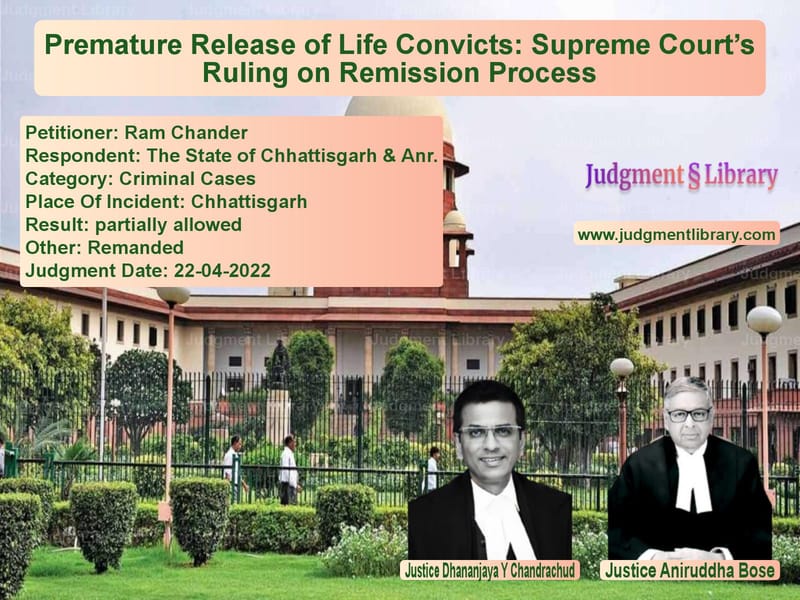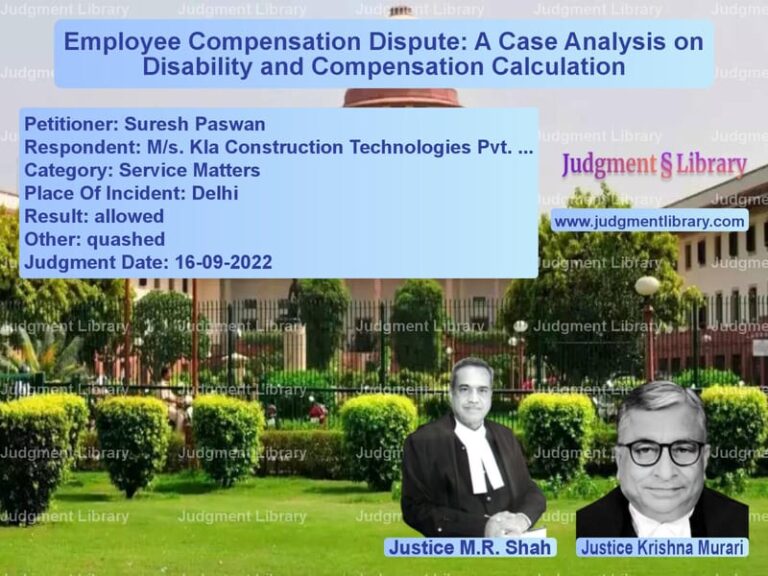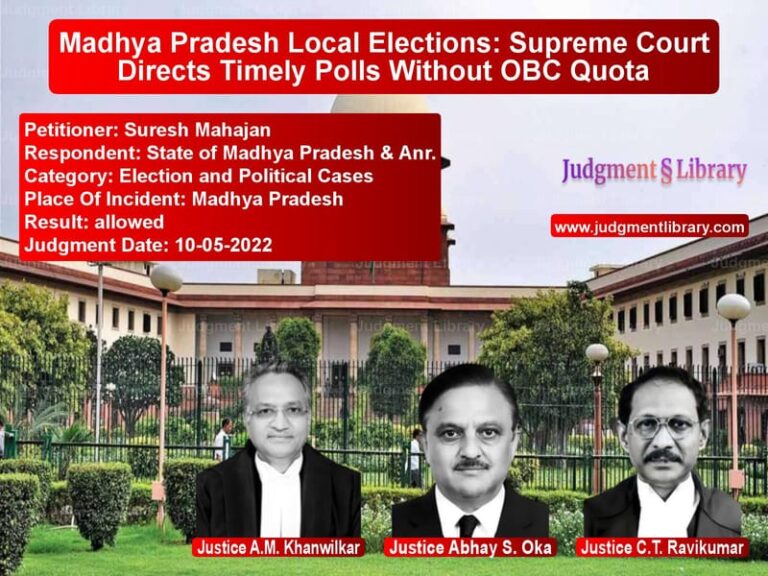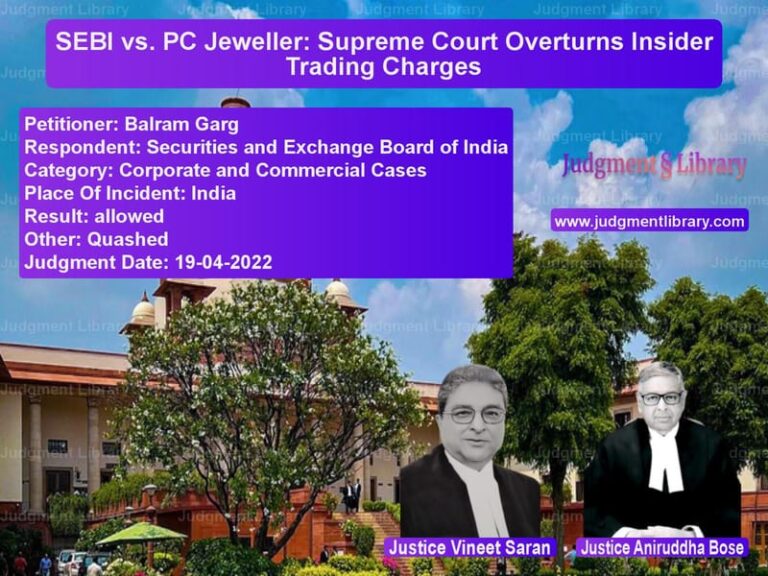Premature Release of Life Convicts: Supreme Court’s Ruling on Remission Process
The Supreme Court of India recently ruled on the case of Ram Chander vs. The State of Chhattisgarh & Anr., addressing the issue of premature release for life convicts under the Chhattisgarh Prison Rules and the Code of Criminal Procedure (CrPC). This case highlights the legal framework governing remission of sentences and the role of judicial opinions in the process.
Background of the Case
Ram Chander, the petitioner, was convicted of murder under Section 302 read with Section 149 of the Indian Penal Code (IPC). On December 7, 2010, the trial court sentenced him to life imprisonment for his role in the killing of two individuals. The conviction was upheld by the High Court of Chhattisgarh on May 10, 2013, and a special leave petition (SLP) before the Supreme Court was also dismissed.
After completing 16 years of imprisonment, the petitioner applied for premature release under Rule 358 of the Chhattisgarh Prison Rules. His application was considered by the prison authorities, and the Special Judge, Durg, was asked to provide an opinion on the request.
On July 2, 2021, the Special Judge recommended against remission, stating that considering the severity of the crime, it would not be appropriate to release the petitioner. Based on this opinion, the State of Chhattisgarh rejected his application, leading the petitioner to approach the Supreme Court under Article 32 of the Constitution.
Legal Issues
- Whether a life convict is entitled to remission under Section 432 and 433-A of the CrPC after completing 14 years of imprisonment.
- Whether the government is bound by the opinion of the presiding judge while considering a remission application.
- Whether the Special Judge’s opinion in this case complied with legal requirements.
Arguments by the Parties
Petitioner’s Arguments
- The petitioner argued that under Section 433-A of the CrPC, a life convict is eligible for remission after completing 14 years of imprisonment.
- While the government must seek the presiding judge’s opinion under Section 432(2), it is not legally bound to accept it.
- The opinion of the Special Judge did not consider relevant factors such as the convict’s conduct in prison, the likelihood of reoffending, and his socio-economic conditions.
- The judgment in Laxman Naskar v. Union of India establishes that remission should be based on multiple considerations beyond the nature of the crime.
State’s Arguments
- The government argued that remission is a discretionary power and not an automatic right.
- The opinion of the Special Judge must be given due weight, and the judge found no grounds to recommend remission.
- The decision in Union of India v. Sriharan (2016) emphasized that the presiding judge’s opinion should guide the remission process.
Supreme Court’s Ruling
Key Observations
- The Court acknowledged that remission is not an absolute right and must be exercised based on proper legal considerations.
- It held that while the presiding judge’s opinion is important, it should be based on a holistic review of the convict’s record and circumstances.
- Merely stating that remission is “not appropriate” without assessing the convict’s behavior, reform, and risk of reoffending is inadequate.
- The Court ruled that the government must reconsider the remission application after obtaining a fresh, well-reasoned opinion from the Special Judge.
Final Decision
The Supreme Court set aside the rejection of the remission application and directed the Special Judge, Durg, to provide a fresh opinion within one month, considering:
- Whether the offense was an individual act of crime or affected society at large.
- The likelihood of the petitioner committing another crime.
- The petitioner’s behavior in prison and whether he has been rehabilitated.
- The socio-economic condition of the convict’s family.
The Court also directed the Chhattisgarh government to make a fresh decision on remission within one month of receiving the revised opinion.
Implications of the Judgment
For Life Convicts Seeking Remission
- Prisoners serving life sentences can apply for remission after completing 14 years, but approval depends on multiple factors.
- Judicial opinion must be well-reasoned and consider the convict’s conduct and reformation.
For the Judiciary
- Judges providing opinions on remission must assess the conduct, rehabilitation, and public safety aspects rather than merely focusing on the severity of the original crime.
- The decision ensures judicial scrutiny over the government’s power to grant or deny remission.
For the Government
- The ruling clarifies that the government cannot mechanically follow judicial opinions if they lack adequate reasoning.
- Future remission applications will require a more structured evaluation process.
Conclusion
The Supreme Court’s decision in Ram Chander vs. The State of Chhattisgarh & Anr. ensures that remission applications are decided fairly, taking into account the convict’s conduct and public safety. The ruling establishes that while judicial opinion is crucial, it must be based on sound reasoning, and the government must conduct a meaningful review rather than rejecting applications solely based on the crime’s nature. This decision sets an important precedent for future cases involving remission of life sentences.
Petitioner Name: Ram Chander.Respondent Name: The State of Chhattisgarh & Anr..Judgment By: Justice Dhananjaya Y Chandrachud, Justice Aniruddha Bose.Place Of Incident: Chhattisgarh.Judgment Date: 22-04-2022.
Don’t miss out on the full details! Download the complete judgment in PDF format below and gain valuable insights instantly!
Download Judgment: ram-chander-vs-the-state-of-chhatti-supreme-court-of-india-judgment-dated-22-04-2022.pdf
Directly Download Judgment: Directly download this Judgment
See all petitions in Bail and Anticipatory Bail
See all petitions in Custodial Deaths and Police Misconduct
See all petitions in SC/ST Act Case
See all petitions in Judgment by Dhananjaya Y Chandrachud
See all petitions in Judgment by Aniruddha Bose
See all petitions in partially allowed
See all petitions in Remanded
See all petitions in supreme court of India judgments April 2022
See all petitions in 2022 judgments
See all posts in Criminal Cases Category
See all allowed petitions in Criminal Cases Category
See all Dismissed petitions in Criminal Cases Category
See all partially allowed petitions in Criminal Cases Category







